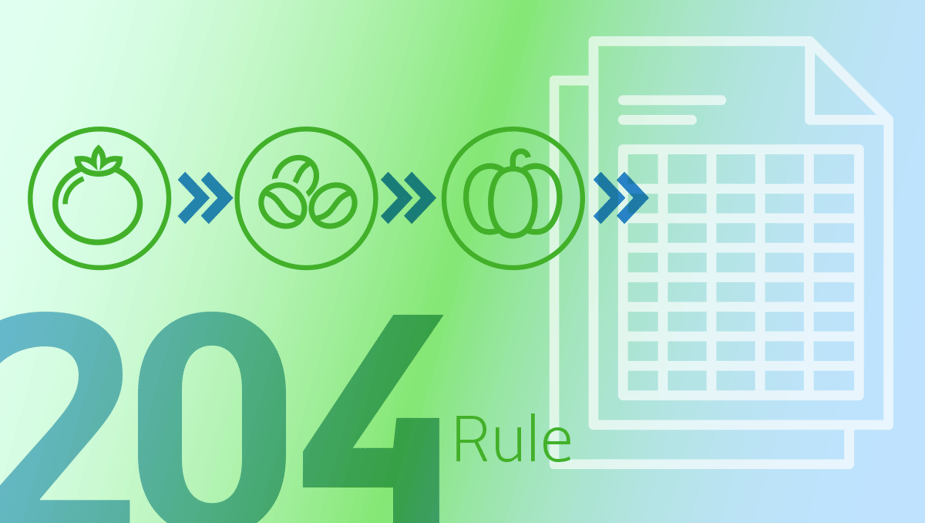
- Home
- PLM & Compliance Blog
- Essential tools for Maintaining Regulatory Compliance Under FSMA Rule 204
Essential tools for Maintaining Regulatory Compliance Under FSMA Rule 204
|
Regulatory
|
Food & Beverage
|
Blogs
Posted By:
Trace One
New FSMA Rule 204 Aims to Minimize Food-borne Illness
The FDA’s Food Safety Modernization Act (FSMA) was signed into law in 2011 with the goal of making food suppliers, manufacturers, and distributors more proactive about protecting the quality and safety of the U.S. food supply. Now, more than a decade later, FSMA continues to evolve and expand to meet the nation’s ever-shifting needs.
The latest development is the FDA’s final rule on “Requirements for Additional Traceability Records for Certain Foods” which sets up new traceability record keeping requirements “for persons who manufacture, process, pack, or hold foods included on the Food Traceability List (FTL).”Commonly called “Rule 204” and established in November 2022, the new requirements described in the rule will facilitate quicker identification and faster removal of potentially contaminated food from stores, restaurants, and other venues to help prevent food-borne illnesses and death.
A New Rule’s Wide Reach
Rule 204 aligns with modern industry best practices and covers domestic and foreign firms throughout the supply chain producing food for U.S. consumption.
While the goals of Rule 204 may be straightforward, the requirements contained within it will be extremely difficult to follow without sophisticated compliance tools.
As the FDA explains on its website, “At the core of this rule is a requirement that persons subject to the rule who manufacture, process, pack, or hold foods on the FTL, maintain records containing Key Data Elements (KDEs) associated with specific Critical Tracking Events (CTEs); and provide information to the FDA within 24 hours or within some reasonable time to which the FDA has agreed.”
The Necessity of Digitization
“The FDA isn’t outright requiring supply chain actors to use electronic traceability solutions,” says Food Traceability & Food Safety Scientist, Sara Bratager. “But most are going to have to digitize their traceability data to meet this requirement, which will be a big change from the dominant, paper-based systems we have today.”
Bottom line? The new rule’s record keeping requirement means that food companies must provide FDA requested information via an electronic, sortable spreadsheet within 24 hours of request to help prevent or mitigate a food-borne illness outbreak, or to address a threat to public health. This means stakeholders will need to be cognizant of critical tracking events and key data elements, traceability lot codes, and traceability plans.
Maintaining Vigilance in a Constantly Changing World
Ever-changing regulations and the increasing complexity of food manufacturing makes constant vigilance and awareness imperative. Today’s food and beverage manufacturers need on-demand visibility into every aspect of ingredient sourcing and packaging to facilitate tracing and tracking and to prevent problems from arising in the first place. And it’s clear that preparing for full implementation of Rule 204 will require significant changes in how many food companies operate.
Adapting to Change is Easier with Trace One Devex PLM
Trace One’s Trace One Devex PLM makes it easier for product managers and other staff to adapt to new regulations such as FSMA Rule 204, and to identify potential risk factors and food safety issues before they become problematic.
As more and more food industry professionals are learning, Trace One Devex PLM gathers and centralizes data to harmonize information across an enterprise, making traceability and reporting simpler and more concise.
Modernizing is easier with Trace One Devex PLM
Shifting from legacy practices to modern, sophisticated procedures isn’t easy, especially for large manufacturers, but once such upgrades are embraced and implemented, the benefits become readily apparent.
With Trace One Devex PLM, food companies are better able to handle the factors that impact compliance, including regulatory specifications, quality specifications, shelf-life data, manufacturing steps, inputs, and more.
Trace One Devex PLM provides integrated tools and processes that boost the visibility, validation, harmonization, and traceability of the data and actions performed at each stage of your product lifecycle, all contained inside of a single, centralized system.
Get ahead of FSMA Rule 204 well ahead of the 2026 deadline by implementing or upgrading your PLM solution.
Interested in finding out how Trace One Devex PLM can help your company stay up to speed on evolving regulations? Schedule a demo today.
